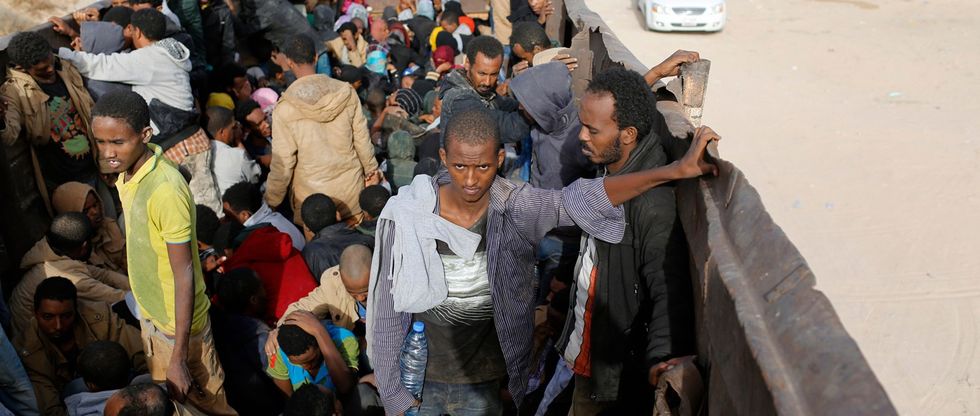A recent report by CNN revealed Libya’s rampant slave trade operation, with video footage depicting a chilling reality: people are being put up for sale, with their lives auctioned off for $400 apiece.
The United Nations estimates that there are some 700,000 African migrants fleeing poverty and economic hardship and attempting to seek refuge in Europe by going through Libya. Selling all their belongings to finance this journey, these migrants and refugees are soon usurped by the country’s slave trade, in which their smugglers effectively become their slave masters. Migrants are then repeatedly “auctioned off” as day laborers for smugglers.
CNN documented one of these auctions – a horrid sight of the commodification of human bodies that are reduced to merchandise for sale and barter. The fate of a dozen men was determined in a matter of six minutes, in which they were sold to new “masters” for 1200 Libyan dinars or $800.
Migrants live in terrible conditions, deprived of food, and exploited and abused by their captors. One survivor conveyed this heartbreaking truth: “if you look at most of the people here, if you check your bodies, you see the marks. They are beaten with electric cables, mutilated.” Many die and those who make it out alive, like 21-year-old survivor Victory emotionally explained, “don’t know where to start from” because they spent their life savings leaving the country and going back home know, they “start back from square one” and it is “very painful.” The financial burden bore by these individuals lies in addition to their worse physical afflictions and psychological trauma.
Victory left Nigeria’s Edo state in pursuit of better opportunities in Europe. He was repeatedly auctioned off and was sold for a ransom, which he was unable to pay until eight months later at which point he escaped from his slave masters. He is now one of many migrants who are held by Libyan authorities for repatriation to their home countries in detention centers – practically cages which engulf 1000 people.
The commodification of human beings in these auctions goes beyond being an injustice of modern-day slavery; it is the core of indecency and fundamentally debases what humanity is about. These individuals’ ability to even speak of the chilling evil they have faced is heart-wrenching. Knowing that at any point in time – especially in our present world – that just one individual had their life treated as negligible and endured such cruelty and suffering brings me to tears.
I am particularly emotional reflecting on the possibility that CNN’s exclusive reporting may have been the first exposure of thousands to the grave international crisis of modern-day slavery. It should strike at the heart of all of us to know that those exploited by the Libya slave trade are not modern-day slavery’s only victims. The painful fact remains that this exploitation is a commonplace reality for over 40 million people internationally.
The United Nations publicly condemned these “heinous abuses” of the Libya slave trade, calling upon authorities to conduct an investigation that will bring perpetrators to justice.
The response to this international human rights crisis does lie beyond a temporary, fleeting empathy which will simply lead us to investigate pre-existing instances of modern-day slavery. We need to collectively and persistently feel one another’s pain so dearly as if it were our own. That’ll embolden our will to ensure that not a single case more of exploitation will come to pass. It is with this understanding of humanity that change can be realized.
















